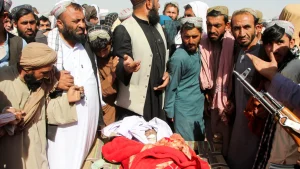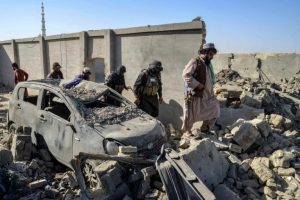Afghanistan – The fragile Pakistan Afghanistan ceasefire faced severe strain on Friday as the Afghan Taliban accused Pakistan of violating the truce with fresh airstrikes in its territory. The alleged violations resulted in the deaths of three local cricketers from Urgun District in Paktika Province, prompting Afghanistan’s withdrawal from an upcoming cricket tournament and raising serious questions about the sustainability of peace efforts.
Tragic Deaths of Afghan Cricketers

The Pakistan Afghanistan ceasefire violations claimed the lives of three cricketers—Kabeer, Sibghatullah, and Haroon—alongside five other civilians from Urgun District. According to the Afghanistan Cricket Board (ACB), the players had traveled to Sharana, the capital of Paktika province, to participate in a friendly cricket match before returning home.
The Pakistan Afghanistan ceasefire breakdown occurred when these cricketers were targeted during a gathering in Urgun following their return. Seven others were injured in the incident, which the ACB characterized as a deliberate attack on civilians. Some sources indicate that eight local cricketers may have been killed in the strike, highlighting the civilian cost of the ongoing conflict.
Afghanistan Withdraws from Cricket Tournament
Expressing profound grief over the deaths, the Afghanistan Cricket Board announced its immediate withdrawal from the upcoming Tri-Nation T20I series involving Pakistan. This unprecedented decision underscores how the Pakistan Afghanistan ceasefire violations have extended beyond military confrontations to impact sporting and cultural relations between the two nations.
The ACB’s statement mourned the martyrdom of the players and fellow countrymen, emphasizing that they were killed after participating in a peaceful sporting activity. This withdrawal represents a significant diplomatic and cultural setback in an already strained relationship.
Fresh Strikes Despite Truce Extension

Despite the Pakistan Afghanistan ceasefire extension agreed upon by both parties, Taliban officials claimed that Pakistan bombed three locations in Paktika province. At least ten people were killed in these fresh strikes, according to Afghan authorities, who accused Islamabad of deliberately violating the cessation of hostilities.
Mohammad Ismail Mawia, a police spokesman in Afghanistan’s Paktika province, specifically stated that Pakistan conducted airstrikes in Barmal and Urgun districts within hours of the truce extension. These strikes occurred even as both nations had reportedly agreed to extend the Pakistan Afghanistan ceasefire until the conclusion of diplomatic talks in Doha.
Also Read: John Bolton Indictment: Shocking Charges Over Classified Documents
Doha Talks and Diplomatic Efforts
The two South Asian neighbors agreed to extend the Pakistan Afghanistan ceasefire through the conclusion of negotiations in Doha, Qatar. A Pakistani delegation had already arrived in Doha, while an Afghan delegation was expected to reach the Qatari capital on Saturday for diplomatic discussions aimed at de-escalating tensions.
The extension of the Pakistan Afghanistan ceasefire came hours after a deadly suicide attack near the Afghan border killed seven Pakistani soldiers and wounded thirteen others. A militant rammed an explosive-laden vehicle into a boundary wall in North Waziristan district, with two others attempting to storm the facility before being shot dead. Six militants were killed in the assault, according to Pakistan’s Prime Minister’s office.
Taliban’s Conditional Ceasefire Stance
Afghan Taliban spokesperson Zabihullah Mujahid clarified Kabul’s position on the Pakistan Afghanistan ceasefire, stating that Afghan forces had been instructed to maintain the truce as long as Pakistan refrained from any attacks. This conditional approach highlights the fragility of the arrangement and the mutual distrust between the parties.
Pakistani security officials emphasized that the Pakistan Afghanistan ceasefire was struck with the Afghan Taliban government and not with Islamist militants operating from Afghan territory who launch attacks inside Pakistan. This distinction points to the complexity of the security situation along the border.
Background of Border Escalations


The current Pakistan Afghanistan ceasefire followed intense border escalations that erupted last weekend. Afghanistan launched airstrikes against Pakistan in retaliation for an alleged attack in the Afghan capital Kabul, which Kabul blamed on Islamabad.
While Afghanistan claimed its strikes killed fifty-eight Pakistani soldiers, Pakistan disputed these figures, stating the toll was twenty-three while claiming to have killed more than two hundred Taliban and affiliated troops in counterfire. The border crossings between Afghanistan and Pakistan were shut on Sunday, October 12, amid escalating tensions.
Diplomatic Intervention
The Pakistan Afghanistan ceasefire was initially brokered after Qatar and Saudi Arabia intervened diplomatically. Pakistani Prime Minister Shehbaz Sharif had vowed a strong response before the Taliban stated it had “other ways to handle the situation if Pakistan does not want to engage in dialogue,” prompting regional powers to facilitate negotiations.
However, clashes were again reported on Tuesday night, resulting in dozens of military and civilian casualties. The two countries subsequently agreed to a forty-eight-hour Pakistan Afghanistan ceasefire, with each side claiming the other had requested the truce.
Pakistan’s Two-Front Concerns
Pakistani officials have expressed concerns about managing security challenges on multiple borders. With ongoing tensions along the Pakistan Afghanistan ceasefire line and existing issues with India, Islamabad faces strategic pressure. Pakistan’s Foreign Minister Khawaja Asif referenced readiness for a “two-front war,” citing India amid the conflict with the Afghan Taliban.
Uncertain Future
The repeated violations of the Pakistan Afghanistan ceasefire cast doubt on the effectiveness of diplomatic efforts to stabilize the border region. The killing of civilian cricketers has added an emotional dimension to the conflict, potentially hardening public opinion on both sides and complicating peace efforts.
As delegations prepare for talks in Doha, the international community watches closely to see whether the Pakistan Afghanistan ceasefire can be sustained long enough for meaningful negotiations to produce lasting solutions to the border tensions that have plagued these neighbors for years.

